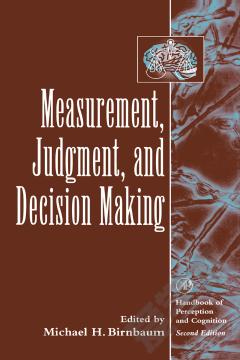Judgments, Decisions, and Public Policy
Behavioral decision theory draws on experimental research in cognitive psychology to provide a descriptively accurate model of human behavior. It shows that people systematically violate the normative assumptions of economic rationality by miscalculating probabilities and making choices based on one-economic criteria. Behavioral decision theory's ability to capture the complexity of human judgments and choices makes it a useful foundation for improving public policy analysis, design, and implementation. Originally published in 2001, this volume showcases the research of leading scholars who are working on applications of behavioral decision theory in diverse policy settings. It is designed to give policy analysts and practitioners who are non-psychologists a clearer understanding of the complexities of human judgment and choice, and suggest how to integrate behavioral decision theoretic insights into the policy sciences. This interdisciplinary volume should be insightful and useful wherever people's judgments and choices matter for policy formulation, acceptance, and effectiveness.
{{comment.content}}








 京公网安备 11010802027623号
京公网安备 11010802027623号